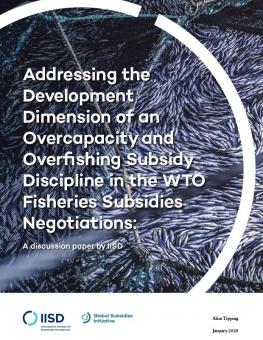
Addressing the Development Dimension of an Overcapacity and Overfishing Subsidy Discipline in the WTO Fisheries Subsidies Negotiations
This discussion paper analyzes approaches to new WTO rules on subsidies that contribute to overcapacity and overfishing in the context of development priorities.
Key Messages
- There are several approaches to the design of new WTO rules on subsidies that contribute to overcapacity and overfishing, each of which could have different results vis-à-vis the negotiating mandate's environment and development priorities.
- Subsidy rules will need to help ensure fisheries are exploited sustainably if WTO Members are to achieve development priorities like food security and poverty reduction in the short and long terms.
- Combining different approaches could help WTO Members to build a set of rules that helps to balance the mandate's environment and development priorities.
This discussion paper analyzes the different approaches under discussion in the World Trade Organization fisheries subsidies negotiations for new rules on subsidies that contribute to overcapacity and overfishing.
The paper argues that achieving the development priorities articulated in the negotiations mandate—food security as well as broader industrial development—in the long and short terms requires a balance between flexibilities for further subsidization and ensuring that subsidies do not deplete the fish stocks on which food security and successful industrial development depend.
The paper examines how the different proposed approaches balance the mandate's priorities. It then examines how the various proposed approaches relate to the negotiating mandate's environmental and development priorities. It provides a high-level analysis of the value of combining different approaches to find a balance that ensures that rules can contribute to development priorities in both the short and long terms.
Participating experts
You might also be interested in
Fisheries Subsidies Video Series
As part of its work to support a meaningful WTO agreement to discipline harmful fisheries subsidies, the IISD has produced a series of six videos to summarize the key issues to be resolved across the WTO fisheries subsidies negotiations.
Potential Implementation Steps of a WTO Agreement on Fisheries Subsidies
As members of the WTO negotiate new rules to curb harmful fisheries subsidies, this policy brief examines the potential steps governments could take to implement successful subsidy reform that promotes more sustainable fisheries.
Determining the Status of Fish Stocks in Data-Poor Environments and Multispecies Fisheries
Some of the possible new World Trade Organization rules on fisheries subsidies could apply only when fish stocks are overfished or fishing is unsustainable. How can this be assessed in the context of data-poor and multispecies fisheries?
Exploring the Possible Impacts of WTO Rules on Fisheries Subsidies: The Case of the Southern Longline Tuna Fishery in the Western and Central Pacific
This case study explores the potential impact of new rules on fisheries subsidies on the southern longline tuna fishery in the Western and Central Pacific ocean.